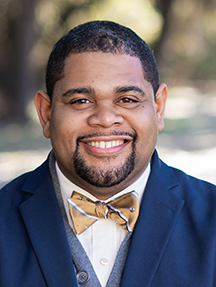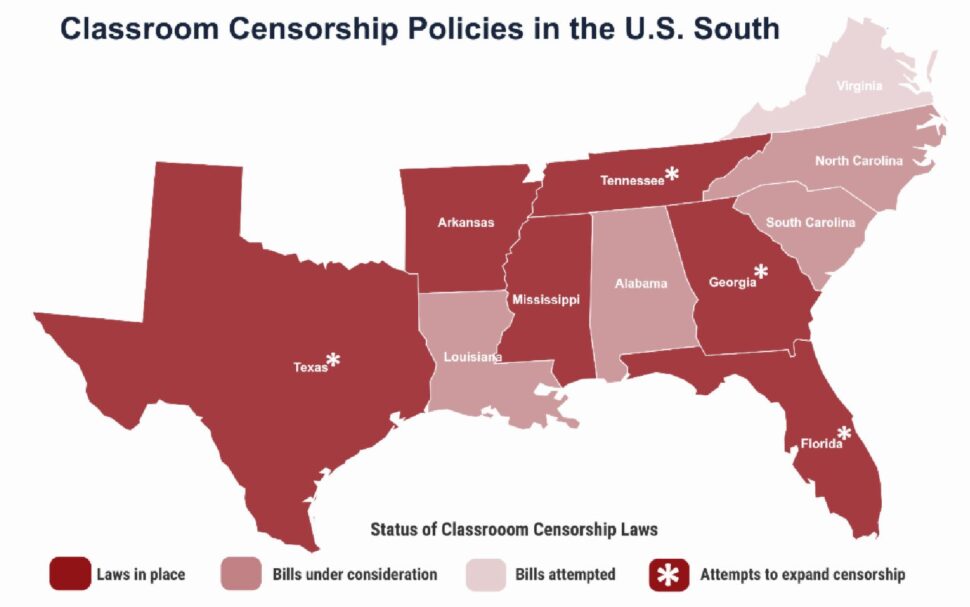• By Terrence Wilson, J.D. • IDRA Newsletter • May 2023 • 
Across the country, particularly in the U.S. South, legislative efforts to limit access to accurate and diverse curricula and books have continued in 2023. The practical impact of these laws is that millions of students across the U.S. South have less access to books and curricula that reflect their experience, particularly if they identify as Black, Latino, Indigenous, a person of color, a religious minority or LGBTQ+. This article describes the classroom censorship developments that have taken place across the U.S. South since last year or so.
Alabama
In Alabama, legislators are again pushing through a pair of “divisive concepts” bills. In 2022, legislators held hearings on House Bill (HB) 312, which sought to limit discussion of so-called “critical race theory” (CRT), race, gender and religion in higher education. These hearings featured significant opposition from organizations, individuals, teachers and faculty members from institutions across Alabama. (Griesbach, 2022). This bill passed the Alabama House but did not receive passage in the Senate.
Undeterred, Alabama legislators have again introduced so-called “divisive concepts” legislation in the 2023 legislative session via Senate Bill (SB) 247 and HB 7. Both bills were passed in committee and have yet to have full floor votes. The session will end in mid-June.
Arkansas
In Arkansas, newly-elected Governor Sarah Huckabee Sanders issued an executive order on her first day in office designed to “prohibit indoctrination and critical race theory in schools” (EO23-05). This order directs the state education department to ensure that no policies promote CRT. Similarly, the Arkansas legislature supported this plan via SB 294/Act 237 enacted on March 8, 2023.
Florida
Florida’s 2022 “Don’t Say Gay” law (HB 1557/Chap. No. 2022-22) prohibits instruction on sexual orientation or gender identity for students in grades K-3. In 2023, the Florida State Board of Education expanded the measure by applying it to teachers of students in all grades (2023).
Florida has continued to seek to limit culturally-sustaining discussions in higher education as well. The Stop WOKE Act (HB 7) is currently enjoined from enactment due to a ruling by Tallahassee U.S. District Court Judge Mark Walker that was affirmed by the 11th U.S. Circuit Court of Appeals. But leaders have continued their efforts to censor higher education. New bills, HB 999 and SB 266, sought to remove degree programs, like critical race theory, critical race studies, critical ethnic studies, radical feminist theory, radical gender theory, queer theory, critical social justice or intersectionality theory, from Florida colleges and universities.
HB 999 stalled in the House, but SB 266 was passed by the legislature. While the final version of SB 266 was revised to not include these explicit references, it still prohibits events or teaching of curriculum that “teaches identity politics” or “is based on theories that systemic racism, sexism, oppression, and privilege are inherent in the institutions of the United States and were created to maintain social, political, and economic inequities.” This bill was signed by Governor Ron DeSantis on May 15, 2023.
Georgia
In 2022, despite opposition by many, including the new Georgia Coalition Against Classroom Censorship, a coalition coordinated by IDRA and including over 100 teachers, students, parents and organizations, Georgia enacted HB 1084 that defines race and racism as “divisive concepts” and prohibits their teaching (Arciaga, 2022; IDRA, May 2022).
In 2022, legislators introduced a version of the “Don’t Say Gay” bill via SB 88. The bill would have significantly limited students’ ability to have conversations and receive information about gender identity and sexual orientation (Arciaga, 2023; Youn, 2023). However, through the advocacy of students, parents, educators and several organizations, including IDRA, the bill was significantly watered down and then tabled in committee. It likely will be considered again in 2024.
Louisiana
While no classroom censorship bills have been filed, one legislator asked for an accounting of how public K-12 and post-graduate schools fund programs and personnel related to critical race theory, diversity, equity, inclusion and transformative social-emotional learning via HR 13. This resolution has not had a hearing by the Louisiana House Education Committee.
Mississippi
Mississippi’s classroom censorship law was passed in the spring of 2022 via SB 2113. The law targets K-12 public schools and public institutions of higher education. In 2023, Mississippi did not enact new classroom censorship legislation.
North Carolina
In 2023, legislators introduced HB 187, which parrots so-called “divisive concepts” legislation offered in other parts of the country. Although the bill passed the North Carolina House of Representatives, it has yet to pass in the Senate.
South Carolina
South Carolina legislators have been the most active across the region with regard to proposing classroom censorship bills. HB 3464 would prohibit promotion of so-called “critical race theory” in all secondary and post-secondary schools in South Carolina. Policymakers also introduced “divisive concepts” bills for public schools via HB 3466, HB 3728, SB 246 and SB 424. Of these, only HB 3728 has progressed through the legislature, passing the South Carolina House and Senate Education committees.
Tennessee
Tennessee legislators seek to expand the reach of their 2021 classroom censorship law via HB 1377/SB 1141. These bills would allow certain residents to file complaints where the law currently only gives students, parents or employees within a district that right. This change would make it easier for conservative advocacy groups to block materials or curricula. The companion bills failed in the Senate Education Committee. They may be reconsidered in 2024.
Texas
In 2022, the Texas legislature passed K-12 classroom censorship legislation first in HB 3979 and then SB 3 in a subsequent special session (Castillo, et al., 2022). In 2023, Texas legislators attempted to ensure that instructional material only portrays the counry and state in a positive light, treats all groups “fairly” and reflects their contributions to the “American way of life” (TLEEC, 2023). This bill, SB 2089, has not been voted out of committee.
Policymakers filed HB 1804, which contains vague language that could lead to classroom censorship, establish discriminatory “Don’t Say Gay” language, and restrict how historical events can be conveyed compromising the accuracy and quality of these materials (Latham Sikes, 2023). This bill has not been voted out of committee.
SB 13 and HB 900 seek to ban material deemed “harmful” (Duggins-Clay, 2023). Both of these bills passed their chambers of origin and are in the other chamber. HB 900 progressed through committees and will be signed by the Governor.
The Legislature is also considering two bills that threaten the quality and accessibility of Texas higher education. SB 17 bans diversity, equity, and inclusion initiatives in colleges and universities. And SB 18 bans faculty tenure at public higher education institutions in Texas.
Virginia
Following up on Governor Youngkin’s Executive Order in 2022 (IDRA, 2022), Virginia legislators this year offered HB 1448, which would have required the adoption of model policies on book selection and removal in public school libraries, but it died after crossing to the Virginia Senate.
Two other bills focus on parent access to information about what students may read in school libraries. HB 1903 would require the creation of a portal detailing the content of schoolbooks and what students check out, while SB 1463 would require labels on “sexually explicit” books. These bills stalled in committee in their chambers of origin.
Conclusion
What happens in state legislatures and governors’ executive offices has a direct impact on marginalized students. The censorship efforts of leaders across the U.S. South impact millions of students who no longer have access to material that reflects and sustains their own cultural and personal identities. The negative impacts of these policies are numerous and include weakened quality curriculum; lower teacher, staff and student morale; limited real-world learning and leadership opportunities for students; and threats to students’ civil rights and safe school climates.
Organizations like the American Library Association and PEN America already report record-high numbers of challenges to books and materials, and these trends will likely continue based on continued legislative action across the region (ALA, 2022; Friedman, 2022). PEN America also filed a lawsuit this month against a Florida school district over book bans that restrict access to books on race, racism and LGBTQ+ identities.
See IDRA’s Knowledge is Power email alerts and join IDRA’s Southern Education Equity Network (https://www.idraseen.org) online for policy and advocacy news.
Citations available online.
Citations
ALA. (2022). State of America’s Libraries Report – Special Report; Pandemic Year Two. American Library Association.
Arciaga, M. (February 14, 2023). LGBTQ+ Students Deserve Supportive Schools that Affirm their Identity IDRA Testimony Against Senate Bill 88, submitted by Mikayla Arciaga, M.A. Ed, to the Georgia Senate Education and Youth Committee.
Arciaga, M. (February 9, 2022). Schools Should Value Student’s Lived Experiences, Not Censor Them – IDRA Testimony against HB 1084 presented to the Georgia House Education Academic Innovation Subcommittee – See video
Castillo, M., Craven, M., Gómez, & Latham Sikes, C. (2022). What Texas’ Classroom Censorship Law Means for Students and Schools. IDRA.
Duggins-Clay, P. (March 21, 2023). Banning Books Makes Schools Less Welcoming for Students to Learn, IDRA Testimony Against House Bill 900, submitted by Paige Duggins-Clay, J.D., to the Texas House Public Education Committee.
Duggins-Clay, P. (March 29, 2023). School Libraries Must Be Reflective and Inclusive of All Students, IDRA Testimony against SB 13, submitted to the Texas Senate Education Committee.
Friedman, F. (April 2022). Banned in the USA: Rising School Book Bans Threaten Free Expression and Students’ First Amendment Rights. PEN America.
FSBE. (March 16, 2023). Rule No: 6A-0.081: Principles of Professional Conduct for the Education Profession in Florida. Florida Administrative Register Vol 49-52. Florida State Board of Education.
Griesbach, R. (February 24, 2022). Alabama educators oppose compromise CRT bill that would ban ‘divisive’ concepts from classrooms. AL.com.
IDRA. (2022). Virginia’s Anti-Equity Executive Order 1 Does Not Require Schools to Limit Curriculum or Instruction. IDRA.
IDRA. (May 5, 2022). What is in Georgia’s Classroom Censorship Law. Knowledge is Power. https://www.idra.org/resource-center/what-is-in-georgias-classroom-censorship-law/
Latham Sikes, C. (April 20, 2023). Censored Restrictions on Instructional Materials Lead to Classroom Censorship, Discrimination and Compromise Students’ Education IDRA Testimony against HB 1804, submitted to the Texas House Public Education Committee.
PEN America. (May 17, 2023). PEN America Files Lawsuit Against Florida School District Over Unconstitutional Book Bans – Lawsuit Asserts Escambia County School Board Unlawfully Removes or Restricts Access to Books on Race, Racism and LGBTQ Identities, news release.
State of Arkansas, Executive Department. (2023). EO23-05: Executive Order to Prohibit Indoctrination and Critical Race Theory in Schools.
TLEEC. (March 29, 2023). Students Suffer Under Classroom Censorship TLEEC Testimony against SB 2089, submitted to the Texas Senate Education Committee.
Youn, R. (March 1, 2023). Senate Bill 88 Discriminates Against LGBTQ+ Students, who Deserve Supportive Schools that Affirm their Identity, IDRA Testimony Against Senate Bill 88, submitted to the Georgia Senate Education and Youth Committee.
Terrence Wilson, J.D., is IDRA’s regional policy and community engagement director. Comments and questions may be directed to him via email at terrence.wilson@idra.org.
[©2023, IDRA. This article originally appeared in the May 2023 edition of the IDRA Newsletter by the Intercultural Development Research Association. Permission to reproduce this article is granted provided the article is reprinted in its entirety and proper credit is given to IDRA and the author.]



